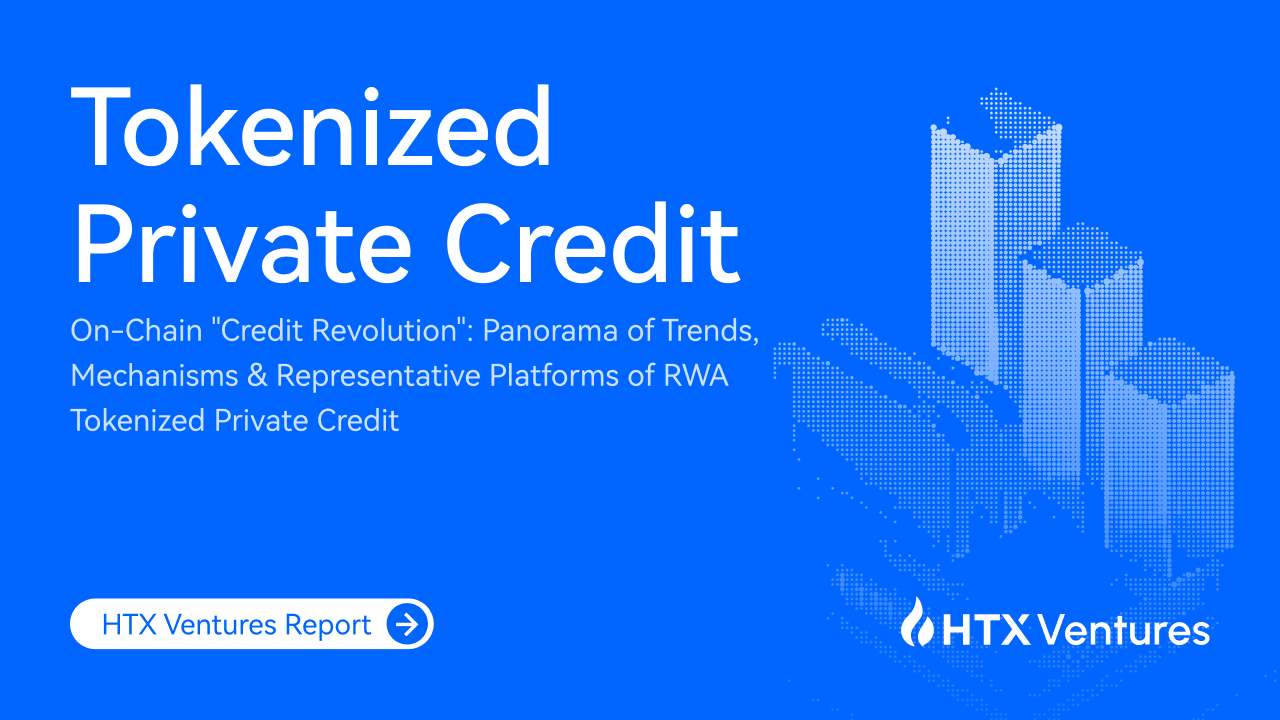Copyright Markets Insider

Panama City, Panama, October 22nd, 2025, Chainwire HTX Ventures, the global investment division of leading crypto exchange HTX, has released its latest research report, delving into one of the most promising developments in the real-world asset (RWA) space: tokenized private credit. The report, titled On-Chain "Credit Revolution": Panorama of Trends, Mechanisms & Representative Platforms of RWA Tokenized Private Credit, explores the evolution of private credit, the advantages and risks of tokenization, and highlights key players leading the charge toward a decentralized credit infrastructure. According to the report, tokenized private credit now accounts for an estimated $12–$16 billion in assets—more than half of the total RWA market as of August 2025—outpacing even tokenized U.S. Treasury bills. This remarkable growth highlights the market’s appetite for higher-yield, blockchain-native investment products that retain real-world value. Private credit refers to non-public lending instruments typically used by institutions to finance businesses and projects. While it has grown into a $2 trillion asset class globally, it remains illiquid, opaque, and largely inaccessible to retail investors. Tokenization seeks to address these pain points by digitizing and fractionalizing private credit instruments, enabling more efficient capital formation and broader access, all while maintaining compliance with traditional legal structures. Compared with traditional private credit, the tokenized model brings several structural advantages. Yields are more competitive as smart contracts streamline origination, registration, and income distribution. This automation reduces operational costs and increases transparency through on-chain tracking of cash flows. Furthermore, while conventional private credit products often require 3–7 year lock-up periods, tokenized credit introduces programmable exit options, such as whitelist-based transfers and secondary market trading. Despite these innovations, liquidity remains a challenge. Secondary markets for these assets are still thin, and real-world events such as borrower defaults must still be managed off-chain. Nonetheless, the report suggests that as regulated marketplaces and token infrastructure evolve, the liquidity premium for tokenized private credit is likely to shrink. The report outlines two main tokenization pathways: transforming traditional funds into on-chain shares, and creating native on-chain credit products via decentralized protocols. The former emphasizes regulatory certainty, while the latter prioritizes composability and real-time settlement. Both models are converging toward a shared goal: unlocking private credit for a broader investor base without compromising legal and risk management standards. A key feature of the report is its deep dive into several representative platforms: Figure, the market leader, has issued over $16 billion in U.S. home equity loans through its proprietary blockchain, Provenance. The platform seamlessly integrates loan origination, on-chain registration, and institutional distribution, commanding over 40% of global tokenized private credit volume. Maple Finance pioneered institutional lending on-chain, offering capital pools for trading firms and funds. While it faced setbacks due to borrower defaults in 2022–2023, it has since improved risk controls and maintains a strong presence across Ethereum and Solana. Goldfinch brought uncollateralized SME lending to Web3, using a dual-tranche model with Backers and Senior Pool. Though impacted by defaults in emerging markets, it remains a case study in transparent credit design. Centrifuge focuses on packaging RWAs into SPVs and issuing senior/junior tranched bond tokens, integrating with MakerDAO and other DeFi protocols to allow senior tranches to serve as collateral for stablecoin issuance—linking traditional credit with DeFi liquidity. Tradable, a rising star built on ZKsync Era, partners with institutional asset managers to tokenize billions in private credit. Its emphasis on ZK-powered compliance and scalability positions it as a high-potential challenger in the space. HTX Ventures’ report also outlines the road ahead for tokenized private credit, focusing on: improving compliance frameworks, standardizing token formats, enhancing secondary liquidity, and deepening integration between DeFi and traditional finance. With global AUM for private credit expected to surpass $3 trillion by 2028, even modest tokenization adoption could unlock hundreds of billions in new on-chain credit assets. About HTX Ventures HTX Ventures, the global investment division of HTX, integrates investment, incubation, and research to identify the best and brightest teams worldwide. With more than decade-long history as an industry pioneer, HTX Ventures excels at identifying cutting-edge technologies and emerging business models within the sector. To foster growth within the blockchain ecosystem, we provide comprehensive support to projects, including financing, resources, and strategic advice. HTX Ventures currently backs over 300 projects spanning multiple blockchain sectors, with select high-quality initiatives already trading on the HTX exchange. Furthermore, as one of the most active FOF (Fund of Funds) funds, HTX Ventures invests in 30 top global funds and collaborates with leading blockchain funds such as Polychain, Dragonfly, Bankless, Gitcoin, Figment, Nomad, Animoca, and Hack VC to jointly build a blockchain ecosystem. Users can visit us here. Users can feel free to contact for investment and collaboration at VC@htx-inc.com Contact Damon



